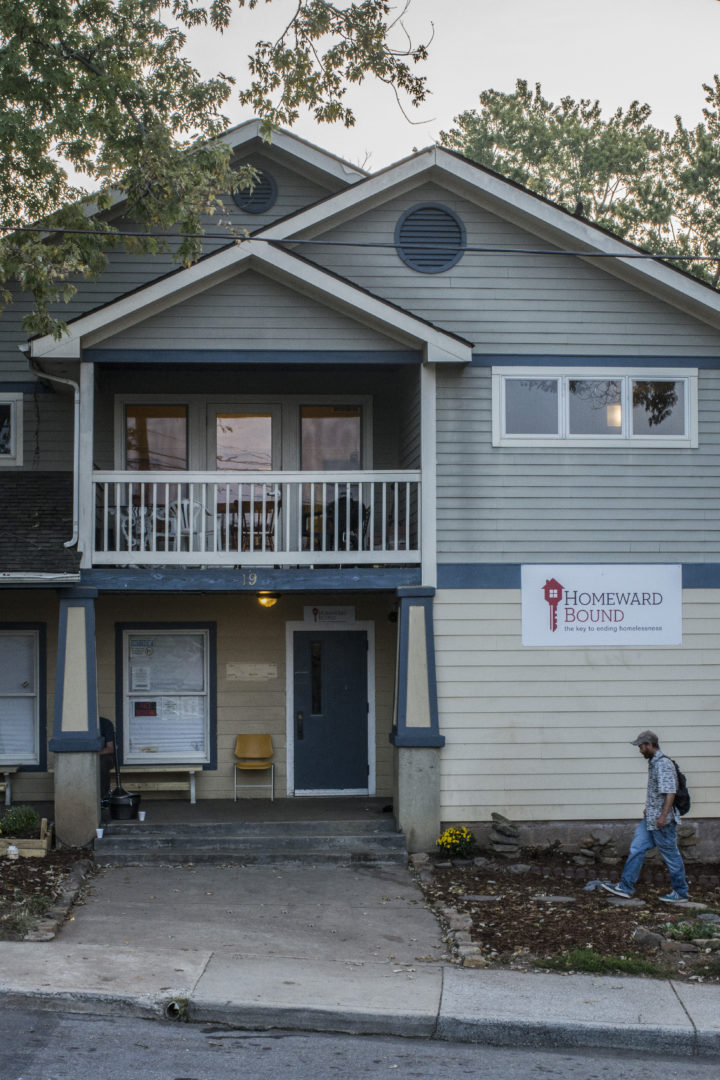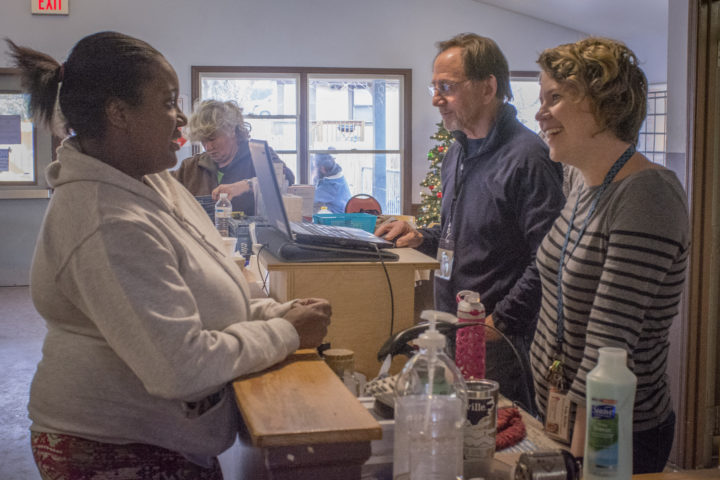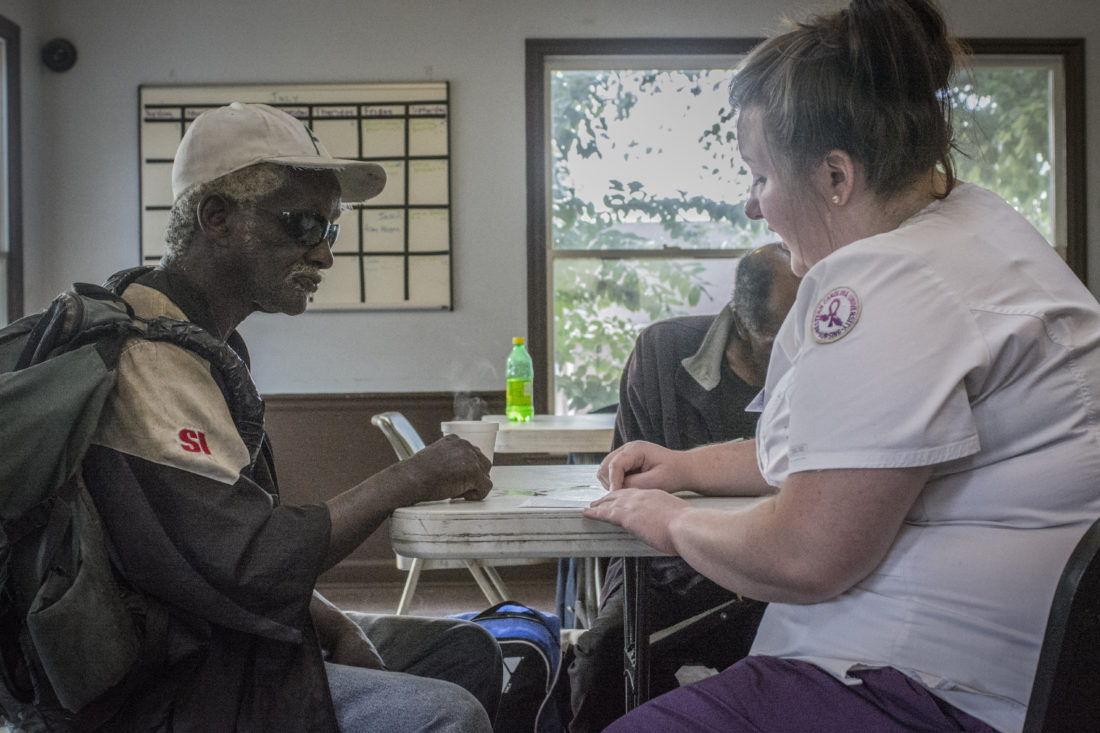Mark Filippini, 56, has been homeless for about four months. “I lost my job due to drugs and I got behind on the rent,” he says, summing up his situation in a sentence.
Filippini is also a veteran, a demographic that makes up a significant percentage of the homeless population in Asheville and Buncombe County. He enlisted in the Army in the late 1980s, serving in San Francisco as a personnel records specialist, taking care of paperwork like insurance policies for other service members. This isn’t the first time he’s been homeless; the longest stretch was a two-year period he spent living in a minivan in Pennsylvania.
According to the nonprofit Homeward Bound WNC, close to half of those experiencing homelessness in Buncombe County are veterans, a figure that also includes people benefiting from long-term transitional housing programs.
While Asheville’s nonveteran homeless population has slowly increased in proportion to growth in the area’s population, the population of homeless veterans in the area has grown much faster, according to Brian Methvin, board chair for Homeward Bound WNC.
That increase could be because homeless veterans are attracted to the unique services offered by the Charles George VA Medical Center and the Veterans Restoration Quarters, a transitional housing program operated by Asheville Buncombe Community Christian Ministry, Methvin says.
“Prior to 2013, we had limited specialized resources to help veterans,” he said. “Since 2013, the VA has created multiple programs, all of which are well-funded.” Today, a network of local agencies, including Homeward Bound WNC, ABCCM and local shelters, acts as a safety net for homeless veterans and nonveterans in Buncombe County.
Asheville witnessed a slight decrease in its homeless population during its 2018 Point-in-Time Count, a single-night snapshot of homelessness conducted once a year. Officials tallied 554 homeless people this year, compared to 562 in 2017. Homelessness among veterans, meanwhile, experienced a slight increase, rising from 239 in 2017 to 247 in 2018.
Gateway to housing
On a cold November morning, Filippini was one of scores of homeless men and women packed into the AHOPE Day Center on North Ann Street in downtown Asheville. There, homeless individuals can grab a cup of coffee, a shower and a slice of bread slathered with butter.

“We don’t really feed people full meals per se — there are other places in town that do that,” Methvin says, “but we want to make sure that people have something.” Homeward Bound WNC operates the AHOPE center and other programs.
The sheer number of trash containers that sit in a row on the curb outside the building, about a dozen, gives a hint at the resources it takes to care for the steady stream of people. A clear bag brimming with Folgers coffee cans — more than any family could drink in a month — sits precariously on top of a garbage-packed pile in a plastic bin at the end of the row.
Because the pipes have to handle hundreds of showers every week, maintenance is an ongoing challenge. In one corner of the building, a bucket catches water dripping from a leaking pipe.
“Our building is not exactly the Taj Mahal,” Methvin says. “We could paint the building upstairs, and within a month it needs to be repainted again because of the 150 people tracking through there a day.”
The center serves as a starting point for homeless people who need to overcome barriers to secure permanent housing. “A lot of people who become homeless can resolve their own homelessness if you give them a small helping hand,” Methvin says.
For some, that help could be replacing a lost Social Security card or photo ID, documents Methvin points out are necessary to get a job. Homeward Bound can cover the cost of replacing those credentials.
The building also acts as a mailing address, and staff working at the day center frequently handle packages that contain camping stoves, tents, clothing and even cell phone chargers.
“Most of them don’t have good access to good laundry care, so you wear a pair of underwear for a week, and they’re trash, so you’ve got to continually replace them,” Methvin says.
Donated items are snapped up quickly. “These types of things will last someone about a week on the street,” Methvin explains. “Just if you’re wearing them all the time.”
The center tries to individualize its assistance, tailoring its approach to fit the exact need of the person it’s serving. Those who stop by the building for a cup of coffee must register at the front desk, which allows the staff to keep track of how many times that person has visited the day center.
Individuals who have been homeless for more than two weeks also go through an assessment process. “We score you compared to all other homeless in Asheville to determine your priority in getting into permanent housing,” Methvin says. Individuals score high if they’ve been homeless for a long time or have a chronic medical condition.
Chronic homelessness
Normally, Methvin says, people find a place fairly quickly. “Between 3,500 and 4,000 people a year will become homeless in Buncombe County,” he says. “At any one time, we’ll have about 450 that are homeless, so you can see the large majority of people during the course of the year will resolve their homelessness.”
Homeward Bound also has a by-name directory of people in Asheville who are chronically homeless. The list is about 200 names long, and for the most part, Methvin says the people on that list have been homeless for an average of eight years. Those years, Methvin says, take a toll on people.
“You’ll see people in the day room,” he says, “and if you were to guess their ages, you’d miss … by 10 to 15 years.”
People who are chronically homeless struggle to find permanent housing because they’re stuck in what Methvin calls a “vicious, dehumanizing cycle.” A lack of housing leads to poor health, untreated medical conditions and limited access to hygiene, which makes employers less likely to hire the person. Convictions for “homeless crimes” such as trespassing or public intoxication compound this problem, creating an arrest record, which makes landlords less willing to house them.
Before anything else, Methvin says, Homeward Bound WNC first prioritizes finding permanent housing for its clients. Housing acts as a springboard to other milestones, like finding a job and rebuilding heath and self-esteem.
Last year, Homeward Bound WNC housed 184 people, according to staffer Eleanor Ashton. About 89 percent of those people remained housed, which Ashton says is largely due to the case management these individuals receive.
Permanent housing
On code purple nights, which occur when the temperature drops below freezing, the Asheville Buncombe Community Christian Ministry sends a van to the homeless camps in the area to bus those sleeping outdoors to one of its shelters.
“If they don’t want to go in, we’ll also provide hats, coats, blankets and a bagged lunch to help them get through the night,” says ABCCM Director Scott Rogers.

There are a total of 184 transitional housing beds in Buncombe County set aside for veterans. In fiscal year 2017, those beds served about 430 veterans.
ABCCM has 158 of those beds, Rogers says. Those in need can stay for up to two years in ABCCM accommodations at Steadfast House, a temporary location at 141 Hillside St. for single women, mothers with children and female veterans, or the Veterans Restoration Quarters, a former motel on Tunnel Road in East Asheville that acts as a residence for male veterans.
About 20 percent of the veterans taking advantage of transitional housing stay with ABCCM for less than 90 days, Rogers says.
For veterans who can’t find permanent housing within a short time frame, the full two-year period of ABCCM housing availability functions as an opportunity to transition to a more stable living environment.
The transition can include job training. “We’re going to find out your work history, what your work skills and education levels are,” Rogers says. “And of course, more importantly, we’re going to find out what kind of work you want to do.”
If a veteran is too disabled to work, ABCCM helps him or her access public benefits, which can allow the veteran to sustain themselves in permanent housing.
ABCCM continues to follow up with veterans for 18-24 months after they have found stable housing, and Rogers says about 97 percent of the homeless veterans who receive permanent housing remain stable at the two-year mark and never return to homelessness.
Can vouch
The Charles George VA Medical Center can house 341 veterans in Buncombe County through the Section 8 Housing Choice Voucher Program.
Vouchers provide federal rent assistance to homeless veterans. “Usually the person who is receiving the voucher pays anywhere from 30 to 40 percent of their monthly income towards their rent and utilities,” says Meredith Malpass, coordinator of the U.S. Department of Housing and Urban Development-VA Supportive Housing program.
There are, however, two big obstacles organizers face with this program: finding affordable housing in Asheville and finding landlords willing to accept the vouchers.
A core group of supportive landlords reaches out to the VA when a rental unit becomes available, Malpass says. “Unfortunately, the number of landlords that we have and rental units that they have does not equal the number of veterans that we have that are searching for housing,” she says.
“We’re a tourist area,” she says. “A lot of people want to be in Asheville and around Asheville, and so that inflates rent at times and really pushes that rent outside what the voucher allows for many of our veterans.”
Building a bridge
Rogers says he often hears about the challenges of going from the regimented lifestyle of the military — “where people are trained to be in a community” — to the more fluid, unpredictable minutiae of civilian life. Veterans, he says, are at increased risk of slipping into homelessness, and fighting that trend can be especially difficult for veterans who don’t have a strong support system at home.
One veteran, Rogers recalls, came to ABCCM about a year and a half ago after her husband abandoned her and her 6-year-old daughter, taking her bank account with him.
She had military experience operating heavy equipment — “She could drive any truck you could imagine,” Rogers says — but was working as a waitress because she didn’t have money to pay for the training required to get a commercial driver’s license.
ABCCM paid the veteran’s rent and arranged a scholarship to attend trucking school for four weeks. “She graduated in three because she really was as good as she said she was,” he says. The day after she got her license, Rogers says, she got a job making $21 an hour.
“It was a great win-win situation,” he says, “but here she was about to be evicted because of her family situation.”
While some veterans experiencing homelessness won’t make the transition to employment, Rogers says his organization seeks to build a bridge between military and civilian life. Securing permanent housing, he says, is a critical part of that transition.




Before you comment
The comments section is here to provide a platform for civil dialogue on the issues we face together as a local community. Xpress is committed to offering this platform for all voices, but when the tone of the discussion gets nasty or strays off topic, we believe many people choose not to participate. Xpress editors are determined to moderate comments to ensure a constructive interchange is maintained. All comments judged not to be in keeping with the spirit of civil discourse will be removed and repeat violators will be banned. See here for our terms of service. Thank you for being part of this effort to promote respectful discussion.